John Hurrell – 12 February, 2013
Of the other two videos, Boredom is a Desk With Legs in a Fish Spa, is the more successful, exploiting the versatile acting of David Wells as he staggers, lurches and crawls around a pond in a paddock just outside Melbourne. Egerton-Warburton has written a script with eight roles that this thespian takes on in rapid succession, including God, the artist about to be born, and G.G-W's farming father.
Raised in Western Australia, but now residing in Melbourne, George Egerton-Walburton here in Auckland presents video works in the three viewing areas of Artspace, works all filmed continuously without editing - and all, apparently, alluding to some moral quandary he at the time was preoccupied with.
Video works these may be - technically - but there is a lot of variation in presentation. In fact the title work in the big square gallery at the top of the stairs, Steaming Ties, is a large revolving 9 metre wide mobile, of which a flat screened monitor is one component of many - working and suspended at one end. The mobile is a long, bending cantilevered bow, and usually it rests with the video screen pressed against a wall with only the auditory soundtrack noticeable. On it the artist is hammily impersonating barking police dogs he accidentally heard on a CB radio, bailing up a burglar he earlier had confronted in his home, whom he let flee and whose scent he then provided to the police.
The video of Steaming Ties (when visible) shows a chicken wandering around on a large tabletop in Egerton-Warburton’s studio, ignoring various artworks around it the artist has considerately left for its aesthetic delectation. At the other end of the mobile, as a suspended counterbalance, we see various items such as carrots (wrapped in wire around a fire extinguisher) and herb seeds growing mouldy in bags of stagnant water - a possible allusion to cooking (or not cooking) the chicken. The suspended sculpture dominates the space, and is intriguing because of its bizarre components. Though the motivation behind its creation remains elusive, it seems to be based on a joke about his art loving audience, a feathered parallel being made.
Looking at the other two videos, Boredom is a Desk With Legs in a Fish Spa, is the more successful, exploiting the versatile acting of David Wells as he staggers, lurches and crawls around a pond in a paddock just outside Melbourne. Egerton-Warburton has written a script for this thespian with eight roles that he takes on in rapid succession, including God, a King (“Hey, who invited you?”), himself about to be born (“I’m coming out!”), an investor in Manhattan (“Wall St is huge…a financial crisis.”) and his farming father (“the large udders rubbing together…stealing from cows?..don’t worry about the cows, just worry about the grass.”). Instead of chickens, anxiety about his family’s exploitation of cattle seems the dominant theme.
The last work, Why are you wearing athletic gear if you are not playing any sport today? was made in Rome when he went into a tourist shop, grabbed a camera, turned it on, sprinted out the door (without paying) and kept continuously running (and filming) for the next 25 minutes, passing all the main tourist highlights of Antiquity and various famous movie locations. However the blurred frenetic pace goes on too long. It gets boring quickly, and is not as interesting as the work using the charismatic Wells and his mumbling and raving, or the massive quirky mobile which unpredictably varies its position each time you look in.
In the unsigned essay that he presents with the show, and his floor talk, Egerton-Warburton says that these three works have at their heart what he calls ‘humanist synesthesia‘ - a ‘condition in which stimulation of one sensory or cognitive pathway leads to involuntary experiences.’ While it is one thing to embrace chance elements in one’s practice - something this artist is interested in (he sees such instability as coming from ethical dilemmas) - it is another to link the unpredictable, involuntary or aleatory to bodily states of ‘cross-over’ or ‘jumbled’ sensation, a well known phenomenon described by many creative individuals from Rimbaud to Kandinsky.
The problem is: does the unpredictability apply to the artist or the gallery visitor? Because in constructing a moving sculpture or training a roaming actor (one with his own batch of interpretative idiosyncrasies) the artist still remains in control despite not being able to predict specific detail within events. There is still a voluntary skeletal narrative (albeit varied) he has put in place, an approximate chain of cause and effect functioning within the artist’s own seemingly incongruent subjectivity, and genuine synesthesia (‘humanist’ or otherwise) to be involuntary would have to break that chain. It doesn’t seem possible.
John Hurrell
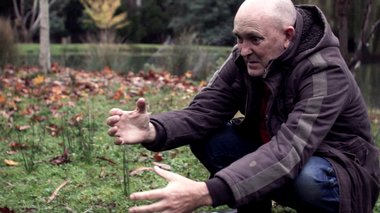
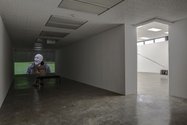
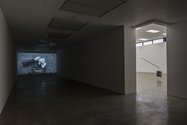
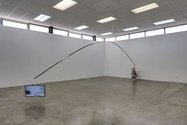
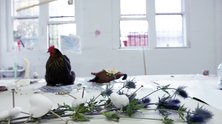
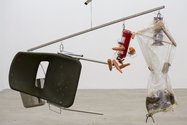

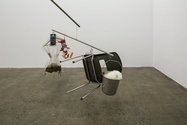
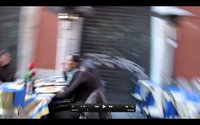
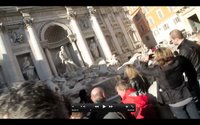
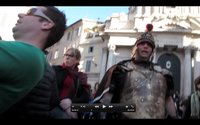
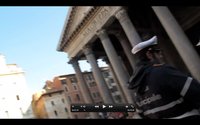
 Advertising in this column
Advertising in this column Two Rooms presents a program of residencies and projects
Two Rooms presents a program of residencies and projects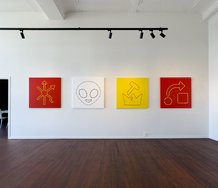
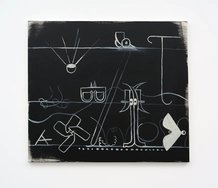
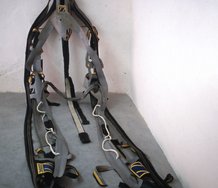
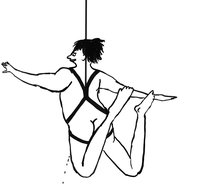
This Discussion has 0 comments.
Comment
Participate
Register to Participate.
Sign in
Sign in to an existing account.